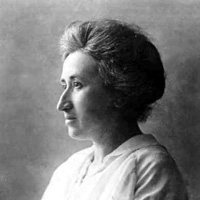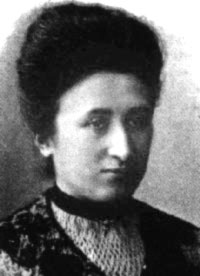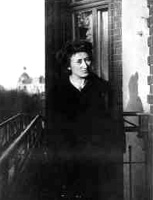|
A Letter by Rosa Luxemburg |
|
'We both,' Rosa added, 'stand here so powerless and spiritless and are united only in pain, in powerlessness and in longing....' "Meanwhile, the prisoners bustled busily about the wagon, unloading the heavy sacks and carrying them into the building. The soldier, however, stuck both hands into his pockets, strolled across the yard with great strides, smiled and softly whistled a popular song. And the whole glorious war passed in front of my eyes.... Write quickly. I embrace you, Sonitschka. Your Rosa Sonitschka, dearest, in spite of it all, be calm and cheerful. That's life and that's how one must take it: courageously, intrepidly and smilingly - in spite of all." Citation taken from: S. Bronner (ed.), The Letters of Rosa Luxemburg (New Brunswick, New Jersey, Humanities Press, 1993) |
 The
fire-brand of the left-wing of the Socialist International before
1914, Rosa Luxemburg was instrumental in keeping alive the revolutionary
vision during the war. Imprisonment did not still her pen, and in
a series of pamphlets and articles which she managed to smuggle out,
she excoriated the patriots in the German Social Democratic Party
who discovered in 1914 that they were more German than socialist.
Nothing better captures her imagination and her temperament than the
above letter that she wrote in December 1917 to Sonja Liebknecht.
By then Luxemburg had been moved to prison in Breslau. The
fire-brand of the left-wing of the Socialist International before
1914, Rosa Luxemburg was instrumental in keeping alive the revolutionary
vision during the war. Imprisonment did not still her pen, and in
a series of pamphlets and articles which she managed to smuggle out,
she excoriated the patriots in the German Social Democratic Party
who discovered in 1914 that they were more German than socialist.
Nothing better captures her imagination and her temperament than the
above letter that she wrote in December 1917 to Sonja Liebknecht.
By then Luxemburg had been moved to prison in Breslau. |
 "In
the yard where I walk, military wagons often arrive, packed full
with sacks, or old uniforms and shirts often spotted with blood....
They are unloaded here, passed out in the cells, mended, then reloaded,
and delivered tot he military. The other day, such a wagon came
drawn by water buffaloes rather than horses. This was the first
time that I saw these animals up close. They are built sturdier
and broader than our oxen, with flat heads, their horns bent flat,
their skulls rather resembling the skulls of our own sheep; the
buffaloes are completely black with large soft eyes. They come from
Rumania, they are trophies of war.... Anyway a few days ago, a wagon
loaded with sacks drove into the prison. The cargo was piled so
high that the buffaloes could not make it over the threshold of
the gateway. The attending soldier, a brutal character, began to
beat away at the animals with the heavy end of his whip so savagely
that the overseer indignantly called him to account. 'Don't you
have any pity for the animals?' 'No one has any pity for us people
either!' he answered with an evil laugh, and fell upon them even
more forcefully.... Finally, the animals started up and got over
the hump, but one of them was bleeding.... Sonitschka, buffalo hide
is proverbial for its thickness and toughness, and it was lacerated.
"In
the yard where I walk, military wagons often arrive, packed full
with sacks, or old uniforms and shirts often spotted with blood....
They are unloaded here, passed out in the cells, mended, then reloaded,
and delivered tot he military. The other day, such a wagon came
drawn by water buffaloes rather than horses. This was the first
time that I saw these animals up close. They are built sturdier
and broader than our oxen, with flat heads, their horns bent flat,
their skulls rather resembling the skulls of our own sheep; the
buffaloes are completely black with large soft eyes. They come from
Rumania, they are trophies of war.... Anyway a few days ago, a wagon
loaded with sacks drove into the prison. The cargo was piled so
high that the buffaloes could not make it over the threshold of
the gateway. The attending soldier, a brutal character, began to
beat away at the animals with the heavy end of his whip so savagely
that the overseer indignantly called him to account. 'Don't you
have any pity for the animals?' 'No one has any pity for us people
either!' he answered with an evil laugh, and fell upon them even
more forcefully.... Finally, the animals started up and got over
the hump, but one of them was bleeding.... Sonitschka, buffalo hide
is proverbial for its thickness and toughness, and it was lacerated.
 Then,
during the unloading, the animals stood completely still, exhausted,
and one, the one that was bleeding, all the while looked ahead with
an expression on its black face and in its soft black eyes like
that of a weeping child. It is exactly the expression of a child
who has been severely punished and who does not know why, what for,
who does not know how to escape the torment and brutality.... How
far, how irretrievably lost, are the free, succulent, green pastures
of Rumania! How different it was with the sun shining, the wind
blowing; how different were the beautiful sounds of birds, the melodious
calls of shepherds. And here: the strange weird city, the fusty
stable, the nauseating mouldy hay mixed with putrid straw, the strange,
horrible people - and the blows, blood running from the fresh wound...."
Then,
during the unloading, the animals stood completely still, exhausted,
and one, the one that was bleeding, all the while looked ahead with
an expression on its black face and in its soft black eyes like
that of a weeping child. It is exactly the expression of a child
who has been severely punished and who does not know why, what for,
who does not know how to escape the torment and brutality.... How
far, how irretrievably lost, are the free, succulent, green pastures
of Rumania! How different it was with the sun shining, the wind
blowing; how different were the beautiful sounds of birds, the melodious
calls of shepherds. And here: the strange weird city, the fusty
stable, the nauseating mouldy hay mixed with putrid straw, the strange,
horrible people - and the blows, blood running from the fresh wound...."